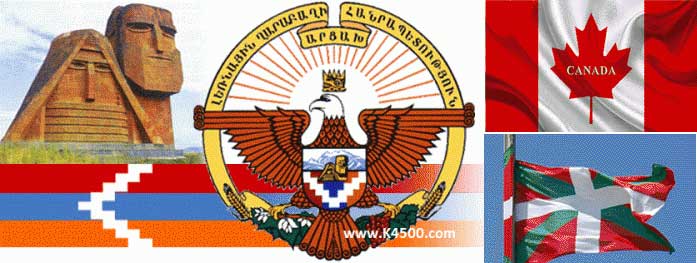From Stepanakert to nations making attempts to become self-determined

The visit of the Minister of Foreign Affairs of the Republic of Artsakh to Canada is within the scope of the visits of Artsakh’s high-ranking officials to different countries, discussions on Artsakh’s political issues in the international arena, transfer of information amid Azerbaijan’s disorientating policy and, of course, meetings with local Armenian communities.
The visit to Canada also made that impression and made people convinced. It’s safe to say that there is not much official information about all this. There is some general information about the assignments that Stepanakert has specified. The following section of the news should be noted: During a meeting with Members of Parliament of the State of Quebec, the Minister of Foreign Affairs of Artsakh presented the current stage of the settlement of the conflict between Artsakh and Azerbaijan, as well as Stepanakert’s position on and approaches to the settlement. The sides also reflected on democratic statehood in Nagorno-Karabakh and the achievements that have been made in that direction. Views were also exchanged on the opportunities for cooperation.
If we look at it deeply, this meeting marked the end of MIrzoyan’s visit to Canada. During this meeting, Artsakh’s delegates mainly talked about nation-buildng in Artsakh hinged on democracy and the achievements that have been made in that direction. Let us get closer to the content in parentheses. The launch of nation-building hinged on democracy is a pan-national referendum, which is implementation of the right to self-determination in line with international law.
Let us get back to Quebec. Let us recall Mirzoyan’s visit to the Land of the Basques nearly one-and-a-half months ago. During that visit, an agreement on cooperation was signed between the cities of Stepanakert and Donostia in which it is stated that the sides, hinged on the principles of equality and mutual benefit, will exchange experiences and will collaborate in different spheres.
Stepanakert also discussed the opportunities for cooperation with Quebec. Now it becomes clearer that Artsakh has specified the nations on the path to self-determination and the political representations representing those nations as a target for business trips. Artsakh is sharing its experiences in being self-determined through a referendum, establishing statehood and building a nation to the representatives of nations that have proposed to become self-determined. Here the results of the referendum or the international evaluation of the self-determination of a given territory or nation are probably secondary. The issue that Stepanakert is probably discussing as a task should be viewed within the scope of the exchange of experiences and the establishment of directions for mutually beneficial cooperation.
In addition, such cooperations, why not, have a positive impact on the implementation of the main agenda for recognition of Artsakh’s independence.
Editor-in-Chief of Aztag Daily
Shahan Kantaharian




 Արևելահայերեն
Արևելահայերեն Արևմտահայերեն
Արևմտահայերեն Русский
Русский






